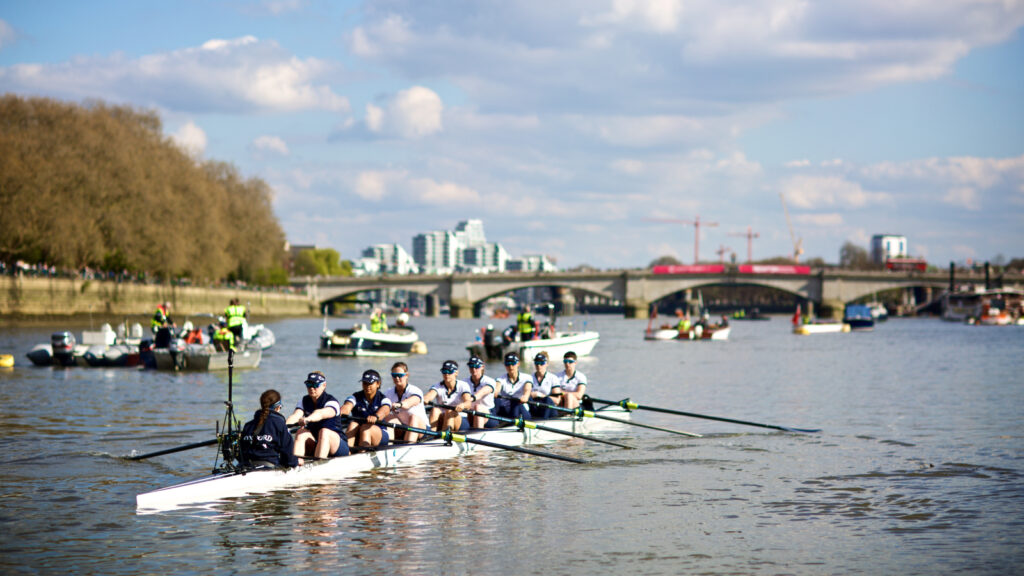Twelve months after a controversy surrounding the water quality at the Boat Race, a new wave of tension has emerged, not only due to environmental concerns but also due to a heated eligibility dispute. Oxford has been at the center of this dispute after successfully challenging the eligibility of three Cambridge students, arguing that their Postgraduate Certificate in Education (PGCE) was not equivalent to a full degree, which led to their disqualification from participating in the race. The three Cambridge rowers, Matt Heywood, Molly Foxell, and Kate Crowley, were barred from competing due to their qualifications, sparking strong reactions from those involved in the event.
Imogen Grant, an Olympic gold medallist and former Cambridge rower, strongly criticized Oxford for its actions, calling the university “slimy” for pushing for the exclusion of the three athletes. While Grant’s remarks were aimed at the controversy itself, she could also have been referencing the actual conditions of the Thames River, which serves as the course for this iconic event. Despite the fervor surrounding the eligibility dispute, it’s clear that environmental concerns regarding the river have continued to persist.
The Thames has long been plagued by pollution, and recent testing has shown that the water quality has not improved. The results revealed E. coli levels that were significantly higher than the safe bathing water standard, with some readings exceeding 6,500 units—far beyond the threshold for what is considered safe. In some places along the racecourse, E. coli levels were found to be three times above the safe limit for bathing. For those participating in the race or watching from the riverbank, the idea of jumping into the water to celebrate or cool off seems unappealing, particularly given the ongoing contamination concerns.
The organisers of the Boat Race, The Boat Race Company, have not made any public statements about whether they are taking additional precautions or providing updated guidelines for participants. However, Siobhan Cassidy, the company’s director, assured that they are closely monitoring the situation and taking steps to keep everyone safe. She urged competitors to wash their hands thoroughly after the race, avoid entering the water if possible, and cover any open wounds before the event. These recommendations come in the wake of the negative publicity generated by last year’s dirty water scandal, which made headlines after it was revealed that water quality tests had found dangerous bacteria along the course.
The eligibility issue has also added a layer of tension to the event, overshadowing the actual race. While the dispute has created divisions within the two universities, it seems that the athletes themselves are staying focused on the competition, leaving the legal and political wrangling to others. As Cambridge’s George Bourne noted, their attention is squarely on the race, and they intend to push aside any distractions. While the three disqualified rowers will undoubtedly experience difficult emotions, they are committed to supporting their teammates from the sidelines, waiting until after the race to process their feelings.
Cambridge’s dominance in the Boat Race, particularly in the women’s race, has been undeniable in recent years, and Oxford’s efforts to challenge the eligibility of Cambridge rowers have been seen by some as a desperate attempt to level the playing field. Cambridge has won five of the past six men’s races and has also been victorious in the women’s competition, winning the last seven consecutive races. This year’s race will be especially significant for the Cambridge women’s team, as victory would extend their winning streak and match the team’s best performance since the 1990s.
Oxford, however, remains determined to break Cambridge’s streak. With a new coaching setup in place after Sean Bowden’s departure and Mark Fangen-Hall taking the reins, the team is eager to reclaim the upper hand. As the race approaches, both crews are determined to put aside any off-water distractions and focus on what they came to do: compete fiercely for victory in one of the most historic events in British sport.

